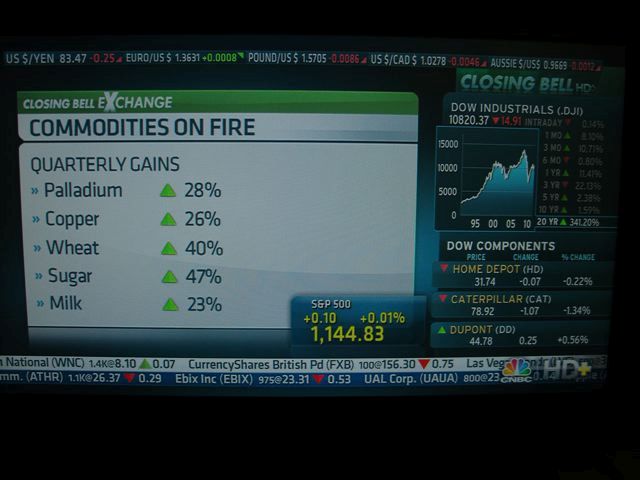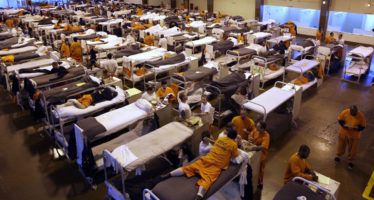Carly Fiorina On Gold And War
OCT. 11, 2010
By JOHN SEILER
Fred Barnes of the Weekly Standard calls the duel for U.S. senator from California “The Most Important Race of 2010: If Fiorina defeats Boxer, liberalism will suffer a grievous defeat.”
His analysis is similar to that of Debra Sanders in the San Francisco Chronicle and a story by the Associated Press: Liberal, ditzy, ineffective Barbara Boxer, the entrenched incumbent, vs. feisty Republican challenger Carly Fiorina, who will bring a Fortune 500 CEO’s competence to the nation’s, and California’s, problems.
But these analyses are missing something, mainly the two most important issues of 2010: the debasement of the value of the U.S. dollar, which now is producing inflation; and the two wars America is fighting, its longest war ever in Afghanistan and the Iraq War, which soon will be the second longest.
Fiorina recently visited The Orange County Register, where I am an editorial writer, to meet with our editorial board for an hour and a half. She lived up to her reputation as a feisty and detail-oriented CEO. And to her credit, her views haven’t morphed since she won the primary in June (unlike Meg Whitman, the GOP candidate for governor, whose views on immigration and other issues have proved malleable).
The dollar’s slide
Since the 9/11 attacks, the value of the U.S. dollar has dropped sharply against gold, from $275 an ounce to $1,346. Which means that the dollar has lost about 75 percent of its value. Previous devaluations, such as during the Civil War and in 1971 (the Nixon Shock), have presaged sharp inflation for a simple reason: Only gold is real money. The only difference between the U.S. dollar and the Zimbabwean dollar is that the U.S. Federal Reserve Board is less undisciplined than Zimbabwe’s central bank.
Moreover, it does seem that things may be changing after a decade of irresponsible actions — devaluing the dollar and keeping interest rates artificially low — under Fed chairmen Alan Greenspan and Ben Bernanke. In an October 4 speech Bernanke have signaled that the party of easy money is over. An analysis of the speech by hard-money advocate Gary North notes:
It was on the looming fiscal crisis of the federal government. There will be no easy way to avoid it, he said. Congress has to decide what spending to cut. This means that Congress must decide which special-interest groups to alienate. Then it must decide which taxes to raise. Whose ox will get gored?
Congress has been deferring this two-part decision since the Nixon administration.
Both the Bernanke speech and North’s analysis are worth reading in full.

People sometimes think “gold bugs” like North, Rep. Ron Paul and yours truly are in a policy dead end.
But on the day we met with Fiorina, I showed her a full-page ad in the Register that day for local gold dealers offering top-inflated-dollar for gold jewelry and other gold items. And consider the nearby picture taken last week off financial news on CNBC.
Commodities rose in the Third Quarter of 2010:
Palladium 28%
Copper 26%
Wheat 40%
Sugar 47%
Milk 23%
Rises in food commodities prices obviously lead to rises in food prices at the grocery store. When that happens, we’ll be stuck back in the “stagflation” — stagnation plus inflation — we suffered in the 1970s malaise economy. Indeed, we may already be there. Although official government statistics show moderate inflation, John Williams’ essential site Shadowstats.com shows that the government has manipulated the numbers. If older formulas for inflation are used, current inflation is about 8 percent.
And as I pointed out in an article last month here on CalWatchDog.com, oil prices historically have been tied to the price of gold at a ratio of 15 barrels of oil to one ounce of gold. So gold’s recent rise also is behind the rise in oil prices (which soon will lead to higher gas prices at the pump). As Proactive Investor headlined, “Oil prices rise as US dollar keeps falling.” It reported, “Oil prices are driven by a strong upward movement in equity markets, which have been buoyant with the S&P 500 and NASDAQ indexes in the US adding more than 2% on Tuesday, while the FTSE 100 advanced 0.8% today.”
Which means, actually, that last week’s stock-market rally was an inflationary chimera.
Carly on gold
When I pointed out these facts — in abbreviated fashion — to Fiorina, she replied, “We need to stabilize, to get debt under control. That’s what the world is looking at. They see our tepid economic recovery stalling. China and Japan” — which hold trillions in U.S. government debt — “don’t see the fundamentals for curtailing spending” by the U.S. federal government.
On gold itself, she said, “An increase in the price of gold and commodities doesn’t mean you go on the gold standard. There’s nothing we can do but return to the fundamentals. The situation will stabilize when you see a return to that.”
She brought up the McCaskill-Sessions bipartisan bill to allow spending increases of only 1.5 percent over 2010 levels, compared to a 9 percent level last year. “We should go further and go back to 2008 levels of spending.” She pointed out that Boxer “cast the deciding vote” in the Senate against McCaskill-Sessions.
She criticized President Obama’s “failed” stimulus, pointing out that “the rebates and tax cuts were temporary in nature. It didn’t relieve the fundamental uncertainty about tax policy.” She said middle-class families “are facing $1,600 tax increases in January. And the 55 percent death tax returns. Congress didn’t do anything about that” before going on recess to campaign for re-election.
Unfortunately, although she sees the danger of “uncertainty” on tax policy, she doesn’t see the even greater uncertainty on wages and prices as gold keeps rising in price and inflation erodes family paychecks, especially for those on fixed incomes.
The wars in Iraq and Afghanistan
I pointed out that many people, including most Americans in some polls, believe that America’s long wars in Iraq and Afghanistan have been failures and that we ought to bring our troops home, saving lives and the immense expense.
“I don’t think they’re clearly lost,” Fiorina said.
I also pointed out that Nobel economist Joseph Stiglitz has calculated that the Iraq War alone has a price tag of at least $4 trillion, possibly $6 trillion, a lot more than the $709 million being claimed by Republicans, based on numbers by the Congressional Budget Office. Stiglitz has figured in not only the direct cost, but such other costs as taking care of wounded veterans and higher oil and gasoline prices. This cost, I suggested, is a major reason the federal government spends too much and is deeply in debt, and the country remains mired in a recession.
“That’s not why we have financial liabilities,” Fiorina responded. “Federal spending has escalated from 20 percent to 26 percent” of GDP. “It’s not an issue of the wars.”
In the CBO study cited above, the $709 spent on the war made up “less than 8% of the federal debt held by the public at the end of 2010 ($9.031 trillion).” But if the Iraq War’s true cost is $6 trillion, to take Stiglitz’s higher estimate, then the portion of the federal debt from the war rises to 68 percent — and more if the Afghan War is included.
She said that it’s important to keep fighting the Afghan War “to prevent al-Qaeda from having a sanctuary there.” She has met Gen. David Petraeus, the current commander in Afghanistan, and was impressed with his plan for victory. She supported increased drone attacks against alleged insurgents and terrorists in Pakistan.
She also supported continuing to keep a large American troop presence around the world, including in Germany and South Korea, because “we have a longstanding relationship with those countries.” She does believe “there is a lot of opportunity to save money in the military. The tooth-to-tail ratio” — military jargon for how much logistics supports each troop in combat — “is as bad as it’s ever been.”
Unfortunately, there wasn’t time to get further into these questions, as seven other editorial writers and reporters were asking questions.
But I wish that, instead of talking only to a general with well-honed PR skills, to find out what’s really going on she would talk to some enlisted men just getting out of the service after fighting these wars. The generals, especially the top ones like Petraeus, are what the late Col. David Hackworth — America’s most decorated trooper at the time of his death — called “perfumed princes.” It’s too bad Hack isn’t still around to keep us informed on what’s really going on in the military.
And a lot of military men, such as retired U.S. Navy Commander Jeff Huber, have cast a doubting eye on both wars. For example, about al Qaeda in Afghanistan, he writes:
CIA director Leon Panetta recently reaffirmed that the number of al-Qaeda in Afghanistan is “50 to 100. Maybe less.” Maybe none. Michael E. Leiter, director of the National Counterterrorism Center, says there are “somewhat more than 300” al-Qaeda characters hiding in Pakistan, which means there are somewhat fewer than 400 there for a total of less than 500 of them in the Bananastans. Since experts like Leiter say the vast majority of al-Qaedeers are in the Bananastans that puts their strength worldwide at comfortably under 1,000. A 2005 report by the Century Foundation said that al-Qaeda never had more than “several hundred” formal members. (The Century Foundation was talking about the real al-Qaeda, not the copyright violators in Iraq. The “al-Qaeda in Mesopotamia” hooligans are like a college that calls itself “The Harvard of Northwest Indiana.”)
As I pointed out to Fiorina, 30 years ago I served in the U.S. Army as a Russian linguist in the Fulda Gap in West Germany, looking over at the huge, nuclear-armed Red Army stationed there, ready to pounce on Western Europe. But the Red Army long has departed, and the Soviet Union itself dissolved almost 20 years ago. To keep troops in Germany at this late date is pure waste.
As a former CEO, she understands that costs and prices are essential to profit. In the political realm, that translates into first sharply cutting the biggest area of waste, the military, and stabilizing prices by returning to real money — a solid dollar based on the gold standard. Unless those reforms are made, cutting spending and taxes won’t be enough to improve the economy. Either Boxer or Fiorina will be part of a U.S. Congress that soon will decide whether to start cutting excessive defense spending — or such popular domestic programs as Social Security and Medicare.
Decades-long wars paid for by inflation has never been a formula for economic prosperity. Only when those two raw sores are healed will prosperity return to America, and California.
John Seiler, an editorial writer with The Orange County Register for 20 years, is a reporter and analyst for CalWatchDog.com. His email: [email protected].
Related Articles
Reagan grace vs. Clinton revenge
The news is filled stories on the vindictive nature of Bill And Hillary Clinton. The Daily Mail reported: A new
Arizona Boycott Initiates Sacramento Recall
Katy Grimes: With Sacramento City Council voting this week to join Los Angeles and San Francisco in the Arizona business
Thousands of California inmates could go free
Nearly 10,000 inmates could leave California prisons within four years, another consequence of the state’s long struggle with the judicial



